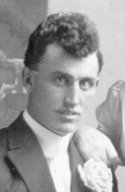 There are prime movers…and, then, there are primer movers. Of such substance was Thomas D. Warburton. He was born of Richard Edward and Laura Amanda (DeWitt Smith) Warburton on October 3, 1891. His demise of advanced age occurred at Tremonton, Utah. For the interim between, much, much water-under-the-bridge.
There are prime movers…and, then, there are primer movers. Of such substance was Thomas D. Warburton. He was born of Richard Edward and Laura Amanda (DeWitt Smith) Warburton on October 3, 1891. His demise of advanced age occurred at Tremonton, Utah. For the interim between, much, much water-under-the-bridge.
Thomas married a lovely, young lady, Clara Ethel Frost of Grouse Creek, Utah, at Grouse Creek, on the 18 February 1918. By Dad’s own account, they were mutually attracted and ready for what the future might hold; both were ready to take on the world, together, whatever might be their lot. Their family was comprised of two daughters and four sons. Of the four sons, two predeceased both of them. These passings were of great anguish to either; so dearly did they love each of us that it was nearly unbearable when one didn’t show up to the dinner table ever again. The two daughters: Ethel Irene on October 9, 1914 and Laura Belle on March 16, 1918. The four sons: Ira Thomas on November 7, 1915; Calvin Frost on January 20, 1921; Richard Neal on January 4, 1926; and Russell Ernest on January 9, 1930. Neal and Ernie were the only two not born in the Etna Valley–Neal at Grouse Creek and Ernie at Salt Lake City. At this sitting, Ernie and I are the only two who remain.
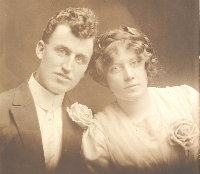
Thomas Warburton & Ethel Frost Warburton
Together, the two of them indoctrinated their young, early on, to the work ethic, what refinement meant, what it was to be morally clean of mind and body, and what it meant to be a responsible individual. Of this latter, my transgression on a couple of occasions brought about corrective measures by Dad that one would not forget for a lifetime. Strange as it might seem, for this I thank him from the bottom of my heart. Too, though it was not overt, each of us knew beyond a shadow of a doubt that they loved us beyond measure; that we were recipient of their fondest wishes and aspiration for our welfare. Assuredly, each of them endured much personal deprivation in order that the six of us, each in our own right, was given the best that their (ofttimes) meager means could afford. Let it be said, however, that I cannot recall an instance wherein I left the table hungry. That fact, in itself, pretty well attests Dad’s ability to manage the affairs of the family much as he managed the affairs of his business–always with aforethought…Back to Dad..
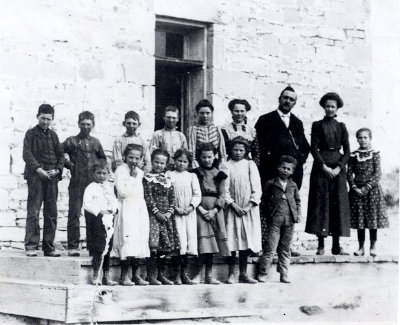
Etna School
Back Row: Warren Jones, Tom Warburton, Valison Tanner, Ralph Tanner, Mary Simpson, Edith Lucas, Henry Blackburn, Amy Warburton, Maude Lucas – Front Row: John (Jack) Jones, Hazel Jones, Emma Lucas, Jennie Douglas, Pauline Warburton, May Douglas, Mark Warburton
Little is manifest relative to his youth, other than his own words regarding the very young days as he and some of his young brothers and sisters played at the “marble hearth” in the original home at Etna. Without any documentation to this period of his life, I am quite willing to conjecture in that regard. Surely, it fostered that which followed in his manhood. No more able-bodied and willing worked trod this earth I have little doubt but that he, very early-on, stepped into the shoes of manhood. As his father’s health declined (“rheumatism”), someone had to pick up the overlay. Couple to this the fact that two brothers were pulled out and inducted into the Army during WWI. Who else, to take up the slack?
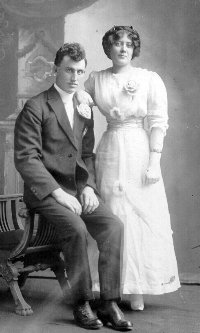
Thomas & Clara Warburton
In my time, I have watched Dad stack meadow hay all day long at a swift pace. As evening came on, he would put the shovel on his shoulder and head for the fields to set the water for barley and alfalfa, morning saw him out again checking/changing these sets before he again climbed up onto the haystack to punch hay around again all day. This, day in and day out.
One of my most invigorating and memorable times with Dad occurred while we were living at the Horseshoe. I can’t tell you how old I was; I can tell you that I was sufficiently tender that I had to reach up to the plow handles much of the time as we would plow the irrigation ditches along the perimeters of the meadows; how I struggled to manipulate the ditcher while Dad drove the team and provided ballast to the point. There were the occasions when we would have to build levies; at which time the slush-scrapper and/or the fresno came into play. (I must have been doing a lot of this in my bare feet. I still can feel the fear of perhaps stepping on a rattler.) An interesting anecdote to me: During the winter, Dad and I were feeding the cattle, Mom was along for some reason this day. We pulled in beside this tall haystack and Dad indicated that I should step up on the hayrack railing and then on up to where he had jabbed his pitchfork into the side of the stack to act as a stepping stone for me. Having accomplished this, my next instruction was to reach as far up as I could, with my own pitchfork, and jab it in. Hanging onto it, solely, I was now on my own, swim or sink. As I clambered for a footing hold in the frozen, snow-covered stack, it became apparent that I was losing ground, headed for a tumble onto the hayrack. It was at this moment that Dad very definitively reached up as far as he could with his pitchfork and planted the tines into the seat of my pants. All this time, Mom was screaming, “No, Tom! No, no, Tom.”) I needed no more persuasion. I shinnied up and stood on the top. About half an hour later, I had knocked enough snow off to allow Dad up with my pitchfork assistance coupled to his.
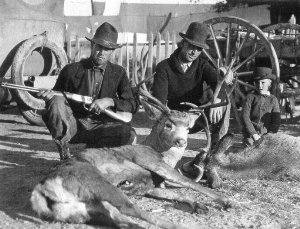
Delbert, Thomas & Ira Warburton
Dad was the seventh of a family of twelve, five brothers and six sisters. The pros and cons of this family are documented elsewhere. Sufficeth it to say that Dad and his five brothers, along with their father and two single uncles carved out a small empire during the years that they operated jointly as a family, and later, as they incorporated and operated as the Whiterock Livestock Company. I have no doubt as to the part Dad played in this scenario. It is for this very reason that I am able to accord him the appellation, prime mover.
Schooling wise, Dad explains in some detail his periods of learning at the rock schoolhouse adjacent to the Morris place. From this account, it would appear that this was an exciting period of his life. On another occasion, he mentions that he attended a half-year of high school at Brigham City. In these same notes, he mentions another half-year at the LDS Business College in Salt Lake City. However great the extent of his formal education, his acumen for sound business composition and practice were the keystone for the discourses of the Company, and individually, for advisement to his family members. As I have spoken elsewhere, there wasn’t an individual who lived in that area who was more conversant with the water rights, livestock conformity–cattle particularly, the section corners, grazing rights and areas, and other of the function to successful livestock production than was he. As otherwise expounded, he was on the cutting edge of most of the litigation, on just such points, that arose in the area. Particularly, was he a wedge against the awesome forces of encroaching big time operators, The Utah Construction Company, Utah Idaho Grazers (sheepmen), and whomever, otherwise, cared to take a whack at the operators in the Etna,Grouse Creek areas.
Dad was elected to, and completed back-to-back, two active four-year terms as a board member for the Box Elder School District. When not actively participating as a board member, he kept current with the trends in education, and he pretty well knew wherein there resided a deficit in quality. With little exception, his activity for progress has been heralded by most of his contemporaries. To this extend, and coupled with his endeavors in the interests of livestock producers, I know of no one:…but no one! Who has been a greater benefactor to the people of that area, generally, than he–in his given generation. His word was his bond; never have I seen him dishonor it.
Dad, without fail, would read the Salt Lake Tribune from cover to cover on a daily basis. He was up to the minute on current affairs, and he delighted when a stranger would stop overnight and discuss issues of the time with him. These people were welcomed and treated graciously by his spouse. We, as children, learned the graces incident to accommodating guests. Having pretty well traveled a goodly portion of the world, those qualities that he and Mom espoused have stood me in good stead. What better recommendation.
This, from my perspective, capsulizes some of the attributes attributable to my (our) father and benefactor. I alone, of all of the children, have ridden along, on a day-to-day basis, kicking stirrups with Dad. As we rode along, our discussions were generally relative to our operations and/or plans for the future. I am reasonably sure that my departure from the livestock producing arena brought a considerable degree of anguish to my father. The white-faced cow was his world. As any father, before or since, has wished for his perpetuation by progeny, so, too, must have he…Life holds a while-bushel of unforeseen quirks and turns doesn’t it?
There were few social amenities in Dad’s life. On occasion, he would participate in the community dances attendant to one celebration or another. His Church affiliation was nil until after he moved into Ogden, at which time he moved into a modicum of activity. Time and health, nullified most of this for him, however…It has been espoused by an associate that, even as we departed the first estate, even our DNA was determined.Think about that. How else then could I have landed otherwise for the second estate? Nor would I have traded for any other parentage. My cup runneth over.
Thomas passed away on January 31, 1986. He is buried in the Brigham City Cemetery in Brigham City, Utah.
Compiled by: R. Neal Warburton
November 12, 1996
